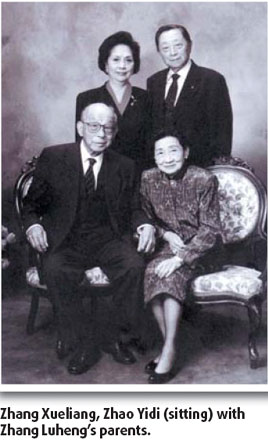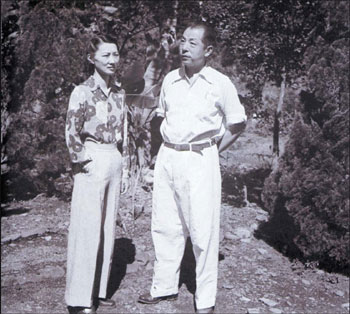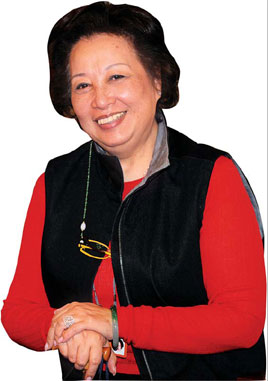United we stand
As a Hong Kong delegate to the country's top advisory body - the National Committee of the Chinese People's Political Consultative Conference (CPPCC), Zhang Luheng's interest in Taiwan might appear misplaced.
"I suggest the government further opens its domestic market to Taiwan," the 68-year-old says. "The tightening of economic ties will help expedite the unification process."
|
Zhang Xueliang and Zhao Yidi in the 1950s. Photos courtesy of Private Photo Album: Days of Confinement |
For those in the know, Zhang, who has been a member of the CPPCC for the past 16 years, was speaking not just for herself or the place she now calls home. She was also speaking for her family, or more precisely, one family member in particular - his love, courage and unaccomplished mission.
That man is Zhang Xueliang and his history is entwined with the nation's.
On Dec 12, 1936, marshal Zhang Xueliang, together with general Yang Hucheng, seized Chiang Kai-shek, the Kuomintang leader, in what came to be known as "the Xi'an Incident".
The event transfixed the world. Two weeks later, it ended when Chiang was freed after promising to work with the Communists in battling the invading Japanese army.
For Zhang, it was the beginning of what amounted to "life imprisonment". After escorting Chiang on a plane back to Nanjing, he was promptly placed under house arrest, vanishing from public view for over half a century.
Chiang took Zhang to Taiwan when the Nationalists fled there in 1949. When Zhang Luheng first met Zhang Xueliang, at the age of 25, she was told to call him "uncle".
"He was the eldest brother of my father. But since my father was 20 years younger, it seemed to me that my uncle and I were separated not by one, but by two generations," Zhang says. "Age had written itself all over his face - the deep furrows seemed to have been made by a carving knife."
"When he looked at me, his eyes were filled with tender love. However, it was the sight of him casting his gaze into the distance, rather absent-mindedly, that stayed with me. The sense of sadness was palpable."
At that time, she was already old enough to understand why. In fact, she had seen her uncle twice before - in hospital around 1954, and at a friend's house years later. Both times, she was unable to say hello, for fear of causing him trouble.

"The first time, I only caught a glimpse of his back from behind a door. The second time, I looked at his fuzzy image through the window for a long time. He was of average stature, slightly plump, with dappled gray hair," Zhang recalls.
"Frankly, that image bore no resemblance to the one I had pieced together for myself from reading the history books. My image was of a general, young, handsome and charismatic, not the jaded old man."
It took Zhang Luheng over two decades to finally meet her uncle and it took her another two decades to get to know him. In the process, her own life has been transformed.
"After finishing university in the United States, I went back to Taiwan in the late 1970s. It was around that time when I began to see my uncle more often."
Zhang says her uncle enjoyed talking to people, especially youngsters, "probably because there were very few people he was actually allowed to talk to."
Most of the time, Zhang and her younger sister were listeners. "My uncle would talk for hours about his life in the Northeast, his childhood, his father, my grandfather, as well as his days on horseback."
She had heard most of the stories before, but he was never tired of telling them and she never tired of listening. She knew that her uncle had been living on those precious memories for so long.
"And believe it or not, those stories have had a huge impact on me," Zhang says.
In 1979, Zhang took a train from Hong Kong to Guangzhou, returning to the mainland for the first time since leaving her hometown in Tianjin, 1948. The first thing she did after going back Taiwan was to visit her uncle.
"I told him everything I'd seen and heard during the journey. And he could never get enough of the details."
Since then, Zhang has been running back and forth between Hong Kong, Taiwan and the mainland.
"I visited all the places my uncle had ever mentioned to me," she says. "I knew he missed those places, and I wanted to see them for him."
In 1982, Zhang met Yang Chengmin, in Beijing. He was the son of general Yang Hucheng, who was killed on the orders of Chiang Kai-shek in September 1949.
"When I told my uncle this he became very excited and wrote down more names that he wanted to hear from."
In 1994, Zhang Xueliang moved to Hawaii, where Zhang Luheng's parents had emigrated a few years earlier.
|
Zhang Luheng in Beijing as a Hong Kong delegate to the National Committee of the Chinese People's Political Consultative Conference. Huang Jingwen |
"I went to visit him every three or four months, and would sometimes stay with him for two months at a time," Zhang says. "Even when he was confined to a wheelchair in his later years, he still loved going out. We took him to the beach every day, where he sat enjoying the sunshine and the breeze."
"Throughout all those years, I never heard him complain. In fact, he's more fond of telling jokes than talking about his personal trials," Zhang says, pausing for a few moments to reflect. "He was a comical person living in a tragedy."
On Oct 15, 2001, Zhang Xueliang, the man who in two turbulent weeks in 1936 helped turn the tide of Chinese history, died in Honolulu, Hawaii, at the age of 100.
In December, 2006, Zhang Luheng and her sister Luzhi published a book titled Private Photo Album: Days of Confinement. In the book were several hundred black-and-white photos of Zhang Xueliang and his life-long lover and companion Zhao Yidi, taken between 1946 and 1960, when the two were under house arrest in Taiwan. Zhang Xueliang took most of the pictures of Zhao.
"When the Xi'an Incident broke out, I wasn't born. And my uncle actually told me very little of what had happened," Zhang says. "He always said: 'History will present the truth for us'."
To many people the general seemed to have left with no worldly concerns. But Zhang knows that her uncle did have one.
"In his final days, like all very old men, he was fond of repeating a few sentences again and again," she says. "One word that was constantly on his lips was 'reunification'."
"That's what he believed would outlast himself."
(China Daily 03/19/2008 page18)
















